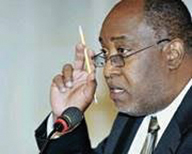Jean-Robert Lafortune was born in Port-au-Prince, Haiti on April 24, 1956. He was an only son. Forced out of Haiti under the Duvalier dictatorship, he ended up in Costa Rica where he resided for a year as a political asylee. He made it to the U.S. in 1980. He earned an Associate Degree from Miami Dade Community College, Undergraduate and Graduate degrees in Public Administration and International Education from Florida International University. After a 7-year stint as Assistant Director at Ideal Vocational School, Jean-Robert spent most of his professional years (21 years) working for Miami Dade County as a Community Organizer and Director of Citizen Participation at the Community Action Agency.
Jean-Robert Lafortune was locally and nationally known for his volunteer work to improve the quality of life of the residents of Miami Dade County and his long-term advocacy for immigrants’ rights. Lafortune is the recipient of several awards and recognition. In 2003, he was named Social Worker of the Year by the Miami Dade County Social Workers Association; in 2002, he was named Employee of the Year by the Community Action Agency. Lafortune was recognized by the 2000 Census for his relentless efforts to get Haitians counted by holding free workshops, training to help low income residents fill out the Census forms properly, and for doing community outreach on weekends. He was recognized by Florida Senator Bill Nelson as an individual who has made a profound difference in his community and the State of Florida. He was tapped by then Congresswoman Carrie P. Meek to head a major initiative to help get residency status for 50,000 Haitian Nationals in the United States. He was key to generate a groundswell to get the Haitian Refugee Immigrant Fairness Act passed the U.S Congress in 1998. He worked collaboratively with Democrat and Republican leaders in the U.S Senate and the U.S Congress for HIRFA to pass.
His daughter Nadine, a registered nurse who previously worked at Aventura Hospital stated, “Jean Robert ‘Sergo’ Lafortune was a loving and devoted father for my little sister Ciara (14 y.o.) and I. A philosophical man who understood the meaning of hard work, he strongly believed in education, and he instilled these core values in us. A wise man, he taught me many life lessons that I will pass on as legacy to his grandchildren Joshua Zamor (8 years old) and Naima Zamor (6 years old). He dedicated his life to the voiceless so that they could also have a seat at the table. Job well done daddy! We are so proud of you and love you endlessly. Rest in God’s Favor.”
Family Action Network Executive Director Marleine Bastien, with whom he worked very closely stated, “Jean-Robert Lafortune was a quiet, yet a very powerful advocate for immigrants’ rights. He was a consensus builder, a trailblazer, an iconic personality who always try to reach out to our better angels, and he’s definitely made an impact. The world has lost a staunch advocate, a champion for human rights. May He Rest in Peace and Power.” Edeline Beauvais-Mondestin , Chief of Elderly and Disability Services Bureau of Miami-Dade Community Action and Human Services Department added, “Employees and seniors were in tears when they heard the news of Jean-Robert’s passing. He will definitely leave a void in our community. Hopefully, other young leaders will learn about his life and decide to build on his legacy.” Wanda Walker, Director of Family and Community Services Division of Miami-Dade Community Action and Human Services Department stated, “Jean Robert Lafortune was a valuable employee of the Miami-Dade Community Action and Human Services Department. As an administrator of the department’s Citizen Participation Unit, Mr. Lafortune made a significant impact engaging low income communities to address issues connected to poverty. He was dedicated professional who displayed integrity, courage, compassion and commitment in his role as an advocate for persons and communities that were disenfranchised. He devoted his life to being a “Good Samaritan.” Mr. Lafortune will be sorely missed by all of us at the Community Action and Human Services Department.”

